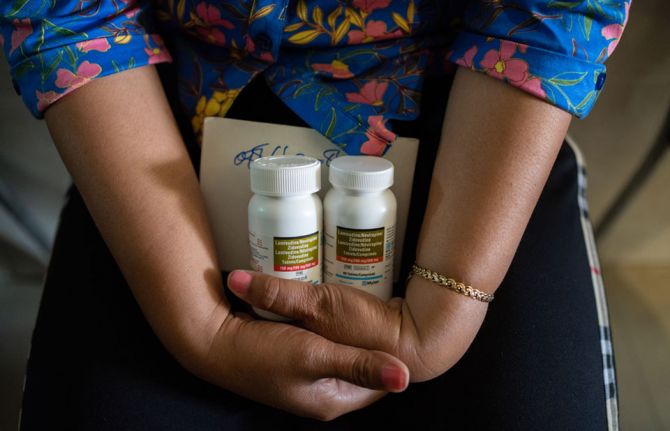

Feature Story
Thai hospitals to provide three- to six-month supplies of antiretroviral therapy
25 March 2020
25 March 2020 25 March 2020Hospitals in Thailand are to dispense antiretroviral therapy in three- to six-month doses in order to prevent people living with HIV from running out of medicines and to reduce their need to access the health system during the COVID-19 pandemic.
The new policy, endorsed by the National AIDS Commission, which is chaired by the Deputy Prime Minister and Minister of Health of Thailand, will be implemented throughout the country, reducing the risk of exposure of people living with HIV to COVID-19 and reducing the burden on the health system and clinical personnel.
People living with HIV who are on antiretroviral therapy under the National Health Security Office (NHSO)—which accounts for 70% of all people living with HIV receiving antiretroviral therapy in the country—are already benefiting from the implementation of this measure. Hospitals under NHSO are extending the length of prescription of antiretroviral therapy for people with a stable HIV condition—people living with HIV who have taken antiretroviral therapy continuously for at least one year, who have suppressed viral loads, who haven’t presented side-effects and who are not pregnant.
“The National Health Security Office has confirmed that there are sufficient supplies of antiretrovirals for all people living with HIV on treatment across the country,” said Rataphon Triamwichanon, the Assistant Secretary-General of NHSO.
“Beneficiaries of the Social Security Insurance Scheme will be able to obtain at least a three-month supply of antiretroviral therapy during the COVID-19 pandemic,” said Amphan Thuwawitm, the Deputy Permanent Secretary of the Ministry of Labor.
Starting from October 2020, NHSO and the Social Security Insurance Scheme will unify the medicine prescription guidelines under the Universal Health Coverage Scheme to allow prescription of a six-month supply of antiretroviral therapy for all eligible people living with HIV.
“UNAIDS applauds Thailand’s leadership and collective efforts from all partners, resulting in timely decisions on implementing multimonth supplies of antiretroviral therapy to support people living with HIV,” said Patchara Benjarattanaporn, UNAIDS Country Director for Thailand. UNAIDS is working closely with the Ministry of Public Health, NHSO, the Ministry of Labor and the Thai Network of People Living with HIV to advocate for the adaptation of the same policy for all health insurance schemes, including private hospitals.
“Through our community members across Thailand, we are monitoring to ensure that hospitals and health-care staff are taking on the implementation of the new policy and are successfully providing multimonth doses of antiretrovirals,” said Apiwat Kwangkeaw, Chairman of the Thai Network of People Living with HIV. “Our peer educators, as members of the Continuum of Care Centre, have also started raising awareness about COVID-19 among people living with HIV and informing them on the precautions they should follow to prevent COVID-19 infection,” add Mr Apiwat.
The Thai Red Cross AIDS Research Center (TRCARC), a civil society organization under the umbrella of the International Red Cross, with support from Her Royal Highness Princess Soamsawali, the UNAIDS Goodwill Ambassador for HIV Prevention for Asia and the Pacific, has also taken important measures to continue to guarantee timely access to HIV prevention services for vulnerable populations.
“We don’t want that the COVID-19 situation becomes a challenging factor that deters people from taking an HIV test. Among the measures we are implementing, we have set up a visible platform outside our Anonymous Clinic with a screening system for every client, where we check temperature and any respiratory symptoms. Our laboratory staff members and counsellors have moved out from the clinic to the platform, where they provide HIV testing and prevention supplies like condoms, post-exposure prophylaxis and pre-exposure prophylaxis (PrEP), as needed. For those who are already on PrEP, we organize home delivery, which clients can request online,” said Nittaya Phanuphak, Chief of Prevention at TRCARC.
All the measures being taken in Thailand will contribute to avoiding potential disruption to HIV prevention, testing and treatment services during the COVID-19 pandemic and to ensuring that people living with HIV and key populations are not left behind.



